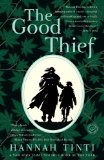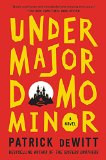Summary | Excerpt | Reading Guide | Reviews | Beyond the book | Read-Alikes | Genres & Themes | Author Bio

A Novel
by Hannah TintiJunot Diaz, Pulitzer Prize-winning author of The Brief
Wondrous Life of Oscar Wao, calls The Good Thief "a lightning strike
of a novel," and Hannah Tinti "a twenty-first-century Robert Louis Stevenson, an
adventuress who lays bare her characters' hearts with a precision and a
fearlessness that will leave you shaken." Elizabeth Gilbert, best-selling author
of Eat, Pray, Love, calls it a masterpiece and "a beautifully composed
work of literary magic," the kind of book "you wish everyone in the world would
read". You could hardly cast a wider net – unless you tossed Danielle Steel and
Thomas Pynchon into the mix. So I must admit, I was intrigued before I even
cracked the cover. Scarcely thirty pages in, I realized what I suspected was
true: this is the book that everyone will love this summer. Not just you,
but your teenage daughter, your 12-year-old grandson, your mother or
grandmother... it's hard to think of someone that won't be taken with this
lovely little book. An adventure tale with a good dose of Gothic finery, The
Good Thief is refreshingly old-fashioned, wonderfully strange, and darkly
funny. It's suspenseful and grim, but you can still read it before bed, and its
charm is quirky enough to keep it from ever becoming twee.
Hannah Tinti embellishes her story with delicious detail, dropping the reader
into each scene with a quick, sure-footed flourish of evocative nouns and
metaphors. Boatyards, graveyards, a mouse-trap factory, and a cast of
unforgettable characters; each come alive instantly, as if sprung from the pages
of an Edward Gorey pop-up book. While most of the characters are drawn in
varying degrees of richly imagined broad strokes, our orphan protagonist Ren is
deeply developed and complex, allowing Tinti to fashion a fairy-tale style
around an emotionally resonant center. Ren is instantly lovable, and Tinti
absolutely nails his young character with surprising and moving details. Early
in the novel, Ren struggles to find a way to say goodbye to the orphanage he
grew up in and dreamed of leaving for so long, and Tinti offers up a ceremony most fitting of a 12-year-old boy:
"All he'd ever wanted was to leave, but now as was about to, he felt uneasy. He walked over to the high brick wall surrounding the buildings and pressed his wet palm against it. The masonry felt as thick and substantial as ever. "Good-bye," he said. But it didn't seem like enough. So he kicked the wall, as hard as he could. The impact made the bones in his leg shake. He stood there panting for a moment, then limped away, his toe throbbing inside his boot."
Unfortunately, the second half of The Good Thief doesn't quite measure up to the great promise of the first. As the plot progresses it wavers dangerously between delightful quirkiness and hokum, resting mostly with the latter by the novel's end. As Tinti pushes forward she loses some of the reader's prized emotional connection with Ren, and the novel ultimately ends up feeling a little ridiculous. Still, the thread of suspense holds up, and Tinti's prose and observations remain beautiful throughout, which makes it easy to forgive any missteps in the plot. All in all, The Good Thief probably won't change your life, but it will remind you of the up-all-night-with-a-flashlight novels of your childhood that, in some way, did.
First Impressions
Eighteen BookBrowse members reviewed this book for First Impressions, rating it an
average of 4.5 out of 5.
You can read their comments here.
![]() This review was originally published in The BookBrowse Review in September 2008, and has been updated for the
September 2009 edition.
Click here to go to this issue.
This review was originally published in The BookBrowse Review in September 2008, and has been updated for the
September 2009 edition.
Click here to go to this issue.

If you liked The Good Thief, try these:

by Patrick deWitt
Published 2016
A love story, an adventure story, a fable without a moral, and an ink-black comedy of manners, Undermajordomo Minor is Patrick deWitt's long-awaited follow-up to the internationally bestselling and critically acclaimed novel The Sisters Brothers.

by Anna Lawrence Pietroni
Published 2011
A story that feels mythical or folkloric, that is driven by a mystery, throbs with tension, and ends in conflagration. Ruby’s Spoon combines a gritty, hypervivid realism with the dreamlike richness of a fable.
Don't join the book burners. Don't think you are going to conceal faults by concealing evidence that they ever ...
Click Here to find out who said this, as well as discovering other famous literary quotes!
Your guide toexceptional books
BookBrowse seeks out and recommends the best in contemporary fiction and nonfiction—books that not only engage and entertain but also deepen our understanding of ourselves and the world around us.